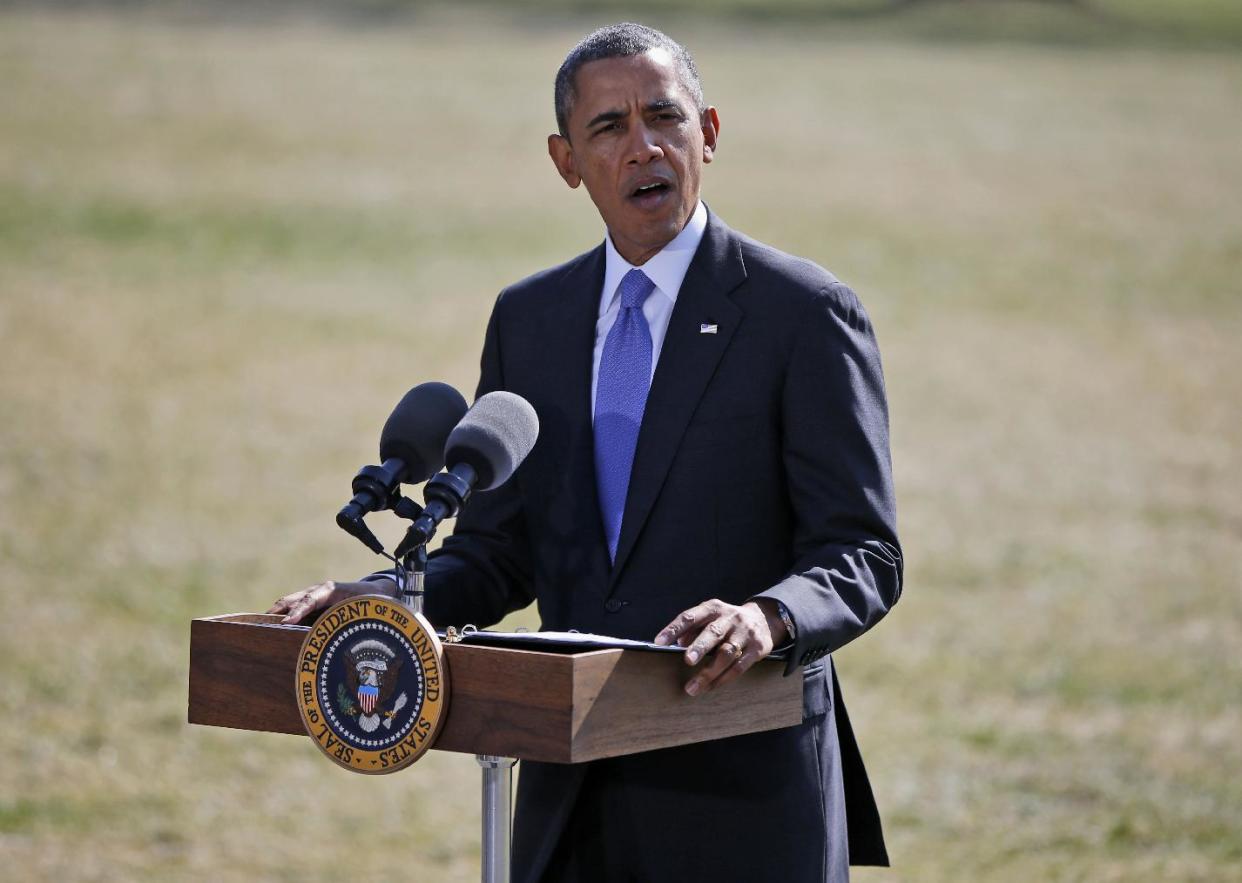Analysis: Russia deeply linked to Obama priorities

BRUSSELS (AP) — Even as he criticizes Vladimir Putin and imposes sanctions on Russia, President Barack Obama is struggling with the consequences of his own earlier quest for a fresh start between Washington and Moscow.
From early in his presidency, Obama has engaged Russia to help achieve some of his key goals, including preventing Iran from becoming a nuclear power and, more recently, solving the war in Syria before it spreads further in the Middle East. Now, he finds that the engagement may limit how hard he can hit back at Russia without toppling everything else.
White House officials insist that the U.S. can't go back to a business-as-usual relationship with Russia as long as Putin still has control of Crimea, the strategically important peninsula he annexed from Ukraine.
Exactly what might be changed is still being debated inside the West Wing. Susan Rice, Obama's national security adviser, said Russia's incursion in Crimea "is causing the countries and people of Europe and the international community and, of course, the United States to reassess what does this mean and what are the implications."
But even as officials warn of curtailed ties with Russia, they're seeking to insulate Obama's most pressing foreign policy priorities from any major harm that might result.
Examples are plentiful and worrisome:
— Russia is part of the international negotiating team working with the U.S. to strike a nuclear deal with Iran.
— The Kremlin's participation is crucial to keeping Syria on track with a plan to rid Damascus of its chemical weapons stockpiles.
— Russia also allows the U.S. to use an alternative to a supply route through Pakistan to bring military personnel and equipment out of Afghanistan as the war there comes to an end.
Then there's the International Space Station and Russia's agreement to ferry American astronauts to and from it. And the concern, more pointed in Europe but well-noted in the U.S., that a deeper rift with Russia could interrupt crucial energy supplies now flowing to European nations.
U.S. officials say they're skeptical Russia would upend any of these partnerships given that its own strategic interests are also at stake. Russia wants access to Iran's economy, which is now cut off from much of the world by U.S. sanctions. In Syria, Putin sees the chemical weapons deal as a way to stave off a possible American military strike and the ouster of his allies in the Syrian government.
American officials say they instead want to cut off cooperation in areas where Russia will suffer more than the U.S. That means stopping joint military operations and canceling trade talks that were eagerly sought by Moscow.
"We must meet the challenge to our ideals, to our very international order with strength and conviction," Obama said Wednesday in Brussels. He closed three days of talks on the Russia dispute with European leaders in the Netherlands and Brussels.
The leaders indefinitely cut Russia out of the Group of Eight assemblage of major nations, a step announced by Obama and Western allies during the president's trip. Western allies also agreed to impose broad economic sanctions on Russia if it advances further into Ukraine.
But so far, U.S. efforts to isolate Russia don't appear to have changed Putin's calculus. After defying warnings from the West and moving troops into Crimea, he formally annexed the peninsula from Ukraine. He's also staged thousands of troops on Russia's border with eastern Ukraine, sparking fears in the U.S. and Europe that he may make a play for more territory.
At home, Obama is getting some low marks for his overall handling of the situation: 57 percent disapprove of his dealings in regard to Ukraine and 54 percent his interactions with Russia, according to a new Associated Press-GfK poll. On the other hand, nearly 9 in 10 support sanctions as a response.
The developments with Russia are hardly what Obama envisioned when he launched his "reset." The policy was aimed at soothing tensions sparked under the George W. Bush administration and paving the way for cooperation on issues like Iran and Afghanistan. But no one expected totally smooth sailing.
"There was never a belief anywhere that Russia was going to evolve into a NATO-like partner or a democracy," said Jeremy Shapiro, a former State Department official and current fellow at the Brookings Institution. "It was always a belief, in fact, that particularly on issues that related to Russia's neighborhood, that Russia was always going to be difficult."
The U.S. and its allies had faced a similar quandary about their relationship with Russia in 2008, when Moscow sent troops into Georgia and recognized the independence of two breakaway Georgian territories, South Ossetia and Abkhazia. The West condemned both steps, but largely resumed normal relations with Russia, even as it violated a cease-fire agreement by keeping its troops in areas it was supposed to evacuate.
U.S. officials suggest it will be harder to resume normal dealings with Russia after this latest flare-up. Russia stopped short of annexing the Georgian territories, but in the case of Ukraine, it formally pulled Crimea within its borders, an action the White House sees as a more flagrant violation of international law. Officials also see Ukraine as a more strategically important country than Georgia.
___
EDITOR'S NOTE — Julie Pace has covered the White House for The Associated Press since 2009. Follow her on Twitter at http://twitter.com/jpaceDC
An AP News Analysis


